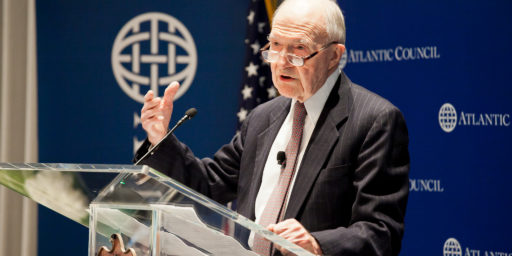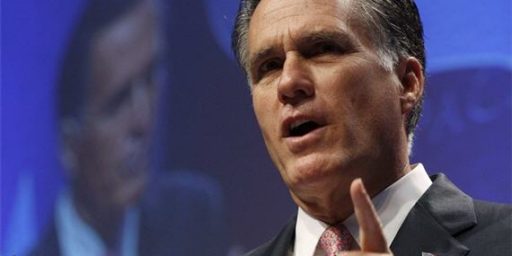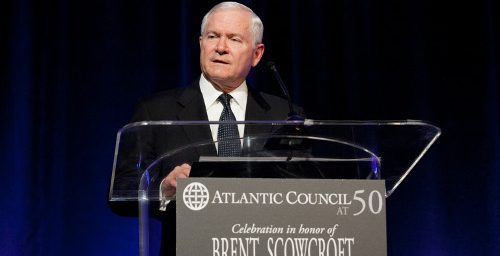In Which I Disagree with Brent Scowcroft
 General Brent Scowcroft issued a statement through the Atlantic Council at noon: “I strongly approve of President Obama’s decision regarding missile defense deployments in Europe. I believe it advances U.S. national security interests, supports our allies, and better meets the threats we face.”
General Brent Scowcroft issued a statement through the Atlantic Council at noon: “I strongly approve of President Obama’s decision regarding missile defense deployments in Europe. I believe it advances U.S. national security interests, supports our allies, and better meets the threats we face.”
Given that I work at the Atlantic Council and have blogged on its site taking a different view, I felt compelled to examine the situation. I do so in “Brent Scowcroft Supports Obama’s Missile Defense Decision.”
As in those old E.F. Hutton commercials, when General Scowcroft talks, I listen. Scowcroft was, of course, National Security Advisor to Presidents Gerald Ford and George H.W. Bush. Less famously, he’s the Chairman of the Atlantic Council International Advisory Board and served as Chairman of the Board of the Council itself from 1998-1999. While there may be four or five people whose views on international security I take as seriously, there’s simply no one I respect more.
After tracing Scowcroft’s words and actions on this subject over the past quarter century, I conclude:
As for myself, I remain agnostic on the technical and strategic merits of the move to sea-based systems vice the previous land-based plan. Nathan Hodge and Robert Haddick do a good job lining up the pros and cons and there are just too many variables and unknowns. And, frankly, I’m rather dubious of the threat of either a Russian or an Iranian nuclear attack, which strike me as woefully overplayed.
So, were we simply starting anew with two options, the Bush plan and the Obama plan, it would be a coin flip. And General Scowcroft’s weighing in on the side of the latter might well tip the scales for me.
My concern, however, is that we weren’t starting from scratch but rather from a status quo where the United States has quite recently promised two allies that we’d put a system in their country that the extant governments considered a significant boost in their security (although, as noted in my earlier roundup, this is not a view universally shared in those states). Further, the Russians have been both demanding that we rescind that deal and behaving badly toward its neighbors. In my view, the optics very much matter in this case.
With General Scowcroft on the other side, though, I hold that opinion with rather more unease and less confidence than I did this morning.
Much more at the link. I’d actually forgotten a lot of Scowcroft’s earlier work on the nuclear issue which, in hindsight, made today’s statement seem inevitable.






Paraphrasing Plato substantially, we all need touchstones but ultimately you have to decide for yourself what is good.
My main concern with relying so much on the sea-based system is that you basically need three Aegis ships to give proper coverage over an area, which means that to provide coverage for Eastern Europe you’d need to keep a bunch of them near the Baltic Coast.
That eats into your supply of Aegis ships pretty quickly, and the things aren’t exactly cheap to run. It’d be much cheaper just to have the land-based installation.
Brett,
The new shield isn’t just sea-based. The SM-3 Interceptors will also be applied to a mobile units on land.
I hope it was a throw away line when Gates mentioned, and I am paraphrasing, that one of the reasons for not proceeding in Europe was the Iranian long range ballistic missile program was not as advanced as previously thought.
How advanced does it have to be to start again?
Poor Poland. They have dealt with betrayal and attacks for hundreds of years. The last great American leftist, F.D.R, bargained them away at Yalta. They, in return,risked everything and along with Walesa, John Paul II, Thatcher and Reagan, brought down the wall and ended the cold war.
In appreciation, Obama now shows them, and the world, what being our ally these days means. The consequence of this in the long run, will be bigger than our deserting Viet Nam and leaving Hungary and Czechoslovia in the face of the evil of communism, which too many in America today seem to appreciate, starting with those in Washington.
Our enemies are watching; they have taken Obama’s pulse, and see (to paraphrase Rham Emanual) opportunity!
Oh look, DL is doing his/her best Triumph impersonation…